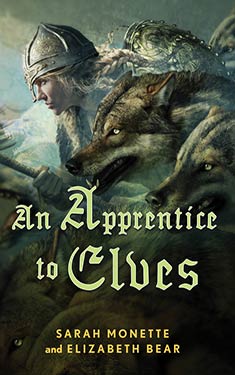Sarah Monette and Elizabeth Bear
Completed 10/8/2023, Reviewed 10/8/2023
3 stars
Finally got to the conclusion of the Iskryne trilogy. It was okay. I thought it better than the middle book, A Tempering of Men. But what I realized with this volume is that I felt that the prose was generally uninteresting. And by prose, I mean the descriptive parts of the book. Usually, the descriptions of the characters and the world fill out the missing parts and make world and the characters come alive as much as the dialogue. In general, though, I simply wasn’t interested in how the authors were describing anything. I just wanted the plotlines to keep moving. I think all three books suffered from this, but it was most evident in this volume because I actually liked the plot and wanted to see what happened next.
The main plot concerns Alfgyfa, the daughter of Isolfr from the first book. Being a woman, she can’t bond with the wolves. So Isolfr sends her to the Elves to apprentice as a blacksmith rather than having her become a housewife-ish person. The book picks up where she goes to the Elves and of course, being human, gets into a lot of trouble. She excels at smithing, but her ideas and actions don’t mesh with the behavior of the underground society of Elves. So Tin, her mastersmith, takes her back to her father, where the Northmen are trying to figure out how to deal with the Rhean invaders. Alfgyfa becomes somewhat of an ambassador to the Elves. There are two factions of Elves, the ones who metalsmiths and the stonesmiths. The two had a schism millennia ago, but now both are needed to help fend off the Rheans. Alfgyfa has a relationship with both and tries to help reconcile the division before the Northmen go to war.
Alfgyfa was generally a likeable character. I enjoyed her feistiness. Tin was also interesting, and in general, the smiths were interesting in that they were female Elves. So if you find the wolf-bonding of the human men a bit misogynistic, you get a reprieve in the women doing traditional masculine work. It made for interesting relationships, particularly between Alfgyfa and other apprentices. I also liked Otter, the woman slave of the Rheans who is rescued by a Northman and taken in as his daughter. Her perspective is interesting as an outsider looking into this wolf-centric society.
I thought this book was better than Tempering in that the characters who were featured were much more definable. There were still too many men and their names, their wolves’ names, and other pseudo-Nordic names still ran together. But the introduction of Elven names as well as the Rhean pseudo-Roman names helped keep from drowning in the similar sounds. And the major points of view were from the women: Alfgyfa, Tin, and Otter.
All in all, I thought this wasn’t a bad book, and it ended the trilogy pretty well. In general though, I don’t think this is that good of a series. Despite giving A Companion to Wolves four stars, I’d give the trilogy as a whole only three stars. Once past the novelty of the human/wolf relationships wears off, it’s just another fantasy, with not much that’s really special.

No comments:
Post a Comment